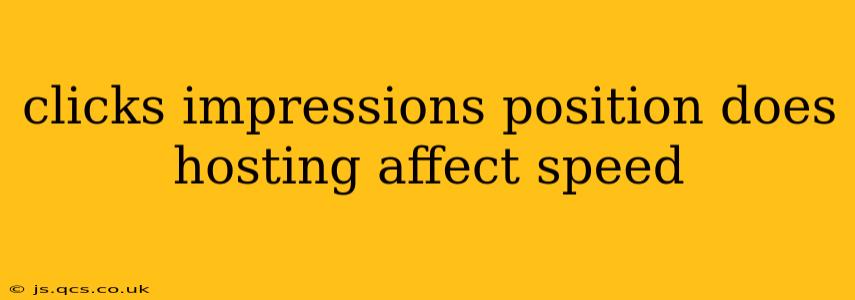Website speed is crucial for success. A slow-loading website can significantly impact your clicks, impressions, and search engine position, ultimately affecting your bottom line. But how exactly does your hosting provider influence this critical aspect of your online presence? Let's delve into the relationship between hosting, website speed, and the key performance indicators (KPIs) that matter most.
What are Clicks, Impressions, and Position?
Before we explore the impact of hosting, let's define these vital SEO metrics:
-
Impressions: This refers to the number of times your website appears in search engine results pages (SERPs). A high number of impressions indicates strong visibility.
-
Clicks: This represents the number of times users click on your website listing from the SERPs. A high click-through rate (CTR) – the percentage of impressions that result in clicks – suggests a compelling title and meta description.
-
Position: This signifies your website's ranking in the SERPs. A higher position (e.g., ranking first) generally leads to more impressions and clicks.
How Does Hosting Affect Website Speed?
Your hosting provider plays a significant role in your website's loading speed. Several factors contribute to this:
-
Server Location: A server geographically closer to your target audience will result in faster loading times. Choosing a hosting provider with servers in strategic locations is crucial.
-
Server Hardware: The quality of the server hardware (CPU, RAM, storage) directly impacts processing power and data transfer speed. High-performance servers are essential for handling traffic and delivering content quickly.
-
Network Infrastructure: The hosting provider's network infrastructure, including bandwidth and connectivity, affects how efficiently data travels between the server and users' browsers. A robust network is critical for consistent speed.
-
Caching Mechanisms: Efficient caching mechanisms store frequently accessed data closer to users, reducing server load and improving response times. Look for hosting providers that offer robust caching solutions.
-
Content Delivery Network (CDN): A CDN distributes your website's content across multiple servers globally, significantly reducing loading times for users in different locations. Many hosting providers integrate CDN services.
Does Slow Website Speed Affect Clicks and Impressions?
Absolutely! Studies consistently show a correlation between slow loading times and reduced user engagement. A slow website:
-
Increases Bounce Rate: Users are more likely to leave a slow-loading website, resulting in a higher bounce rate (the percentage of visitors who leave after viewing only one page). High bounce rates signal to search engines that your website isn't providing a good user experience.
-
Reduces Dwell Time: Dwell time is the amount of time users spend on your website. A slow website discourages users from staying, leading to shorter dwell times, which negatively impacts your search engine ranking.
-
Impacts Conversions: Slow loading times can frustrate users and prevent them from completing desired actions (e.g., making a purchase, filling out a form). This reduces your conversion rate.
-
Lowers Search Engine Ranking: Search engines prioritize user experience. Slow websites are penalized in search rankings, resulting in fewer impressions and clicks.
How Can I Improve My Website Speed?
Optimizing your website's speed requires a multifaceted approach. In addition to choosing a reliable hosting provider, consider:
-
Optimizing Images: Compress images to reduce file sizes without sacrificing quality.
-
Minifying Code: Remove unnecessary characters from your HTML, CSS, and JavaScript code to reduce file sizes.
-
Leveraging Browser Caching: Configure your website to store frequently accessed resources in users' browsers, reducing the need to download them every time.
-
Using a CDN: Distribute your website's content across multiple servers globally to reduce loading times for users in different locations.
What Type of Hosting is Best for Website Speed?
The ideal hosting type depends on your specific needs and budget. However, generally, managed WordPress hosting or cloud hosting solutions offer better performance and speed optimization features than shared hosting.
Conclusion
Hosting significantly impacts website speed, which directly affects your clicks, impressions, and search engine position. By carefully selecting a hosting provider and employing website optimization techniques, you can improve your website's performance and enhance your online success. Remember, speed is a critical factor in providing a positive user experience and achieving higher rankings.
